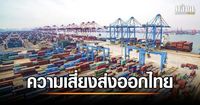Thailand is bracing for a significant shift in its export landscape as the United States prepares to announce reciprocal tariffs on April 2, 2025. This measure, part of President Donald Trump's ongoing "America First" trade policy, aims to address perceived unfair trade practices among its trading partners. With Thailand ranking 11th in terms of trade surplus with the U.S., the country faces potential challenges that could impact its export economy.
According to the Office of Trade Negotiations and International Trade Organization (OTNI), the reciprocal tariffs could have both positive and negative implications for Thai exports. Sonthi Ratnachotiphat, an official from OTNI, emphasized that the impact of these tariffs could manifest in four key areas. The Thai government, led by Commerce Minister Wanich Wangnaitham, is actively preparing to engage in negotiations to mitigate adverse effects while seeking opportunities to enhance trade relations with the U.S.
In 2024, Thailand's exports to the United States were valued at approximately $45.609 billion, while imports stood at $40.725 billion, reflecting a substantial trade surplus. However, the upcoming tariffs could target a range of Thai products, including electronics, solar panels, and agricultural goods, which have been consistently performing well in the U.S. market. The potential for increased tariffs on these goods raises concerns about the competitiveness of Thai exports.
"We are closely monitoring the situation and preparing our strategies to address the challenges posed by these tariffs," said Wanich. He noted that the Thai government is focusing on increasing imports from the U.S. to balance the trade deficit and strengthen bilateral ties. This includes prioritizing products that benefit both nations and can serve as components in mutual supply chains.
One of the primary concerns for Thailand is the risk of being perceived as a conduit for Chinese goods entering the U.S. market. The increasing trade surplus with the U.S. coincides with a growing deficit with China, leading to scrutiny of Thailand's role in rerouting goods. This situation could compel the U.S. to impose stricter regulations on Thai exports, particularly in industries such as electronics and solar energy.
Moreover, the U.S. has previously implemented anti-dumping measures against Thai products, particularly in the steel and solar panel sectors. The Thai government is taking these past experiences into account as it formulates its approach to the upcoming tariffs. The aim is to ensure compliance with U.S. regulations while protecting local industries from potential fallout.
As the Trump administration prepares to unveil its tariffs, it is also conducting a comprehensive review of trade practices and agreements with various countries. This includes examining the implications of the United States-Mexico-Canada Agreement (USMCA) and the potential for new trade negotiations that could benefit American exporters. The focus remains on fostering fair trade practices and addressing any concerns related to circumvention.
In light of these developments, the Thai government is exploring ways to diversify its export markets and reduce reliance on traditional partners. This strategy includes seeking opportunities in emerging markets in South Asia, Latin America, and Africa. By creating a more diverse trade portfolio, Thailand aims to mitigate risks associated with potential trade barriers.
Additionally, the Thai government is emphasizing the importance of technological advancements in enhancing the competitiveness of its exports. Investments in digital technology and artificial intelligence (AI) are seen as crucial for modernizing production processes and improving the quality of Thai goods.
Despite the challenges posed by the impending tariffs, there are still positive indicators for Thailand's export sector. The global demand for agricultural and food products remains strong, driven by concerns over food security amid geopolitical uncertainties. This demand could help offset some losses incurred from increased trade barriers.
Furthermore, the Thai government is committed to supporting local businesses in navigating the complexities of international trade. Initiatives aimed at providing assistance to entrepreneurs and exporters are being prioritized to ensure that they can adapt to the changing trade environment.
In conclusion, Thailand faces a pivotal moment as it prepares for the announcement of reciprocal tariffs by the United States. The government's proactive approach to trade negotiations, coupled with efforts to diversify export markets and invest in technology, will be essential in mitigating the potential impacts of these tariffs. As the global trade landscape evolves, Thailand's ability to adapt and respond effectively will determine its success in maintaining a robust export economy.



